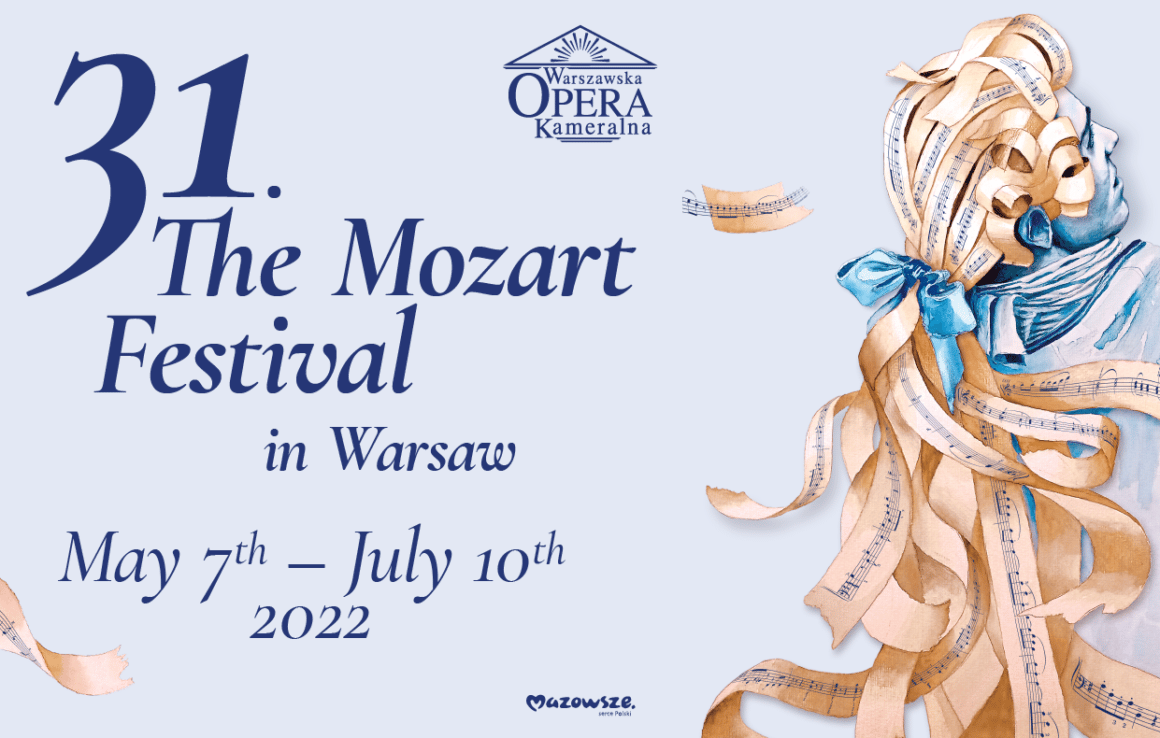Opening Gala of
the 31st Mozart Festival in Warsaw
Concert Hall of the Warsaw Philharmonic
A concert promoting the latest music publications of the Warsaw Chamber Opera
Part I
Wolfgang Amadeus Mozart – Selection of opera overtures
Ancient Instruments Ensemble of Warsaw Chamber Opera
Musicae Antiquae Collegium Varsoviense
Conductor: Radosław Kamieniarz
Programme:
1. „Apollo et Hyacinthus” KV 38.
2. „La finta semplice” KV 51.
3. „La finta gardiniera” KV 196.
4. „Idomeneo, re di Creta” KV 366.
5. „Le nozze di Figaro” KV 492.
6. „Don Giovanni” KV 527.
7. „Cosi fan tutte” KV 588.
8. „La clemenza di Tito” KV 621.
Wolfgang Amadeus Mozart is often seen as the creator of the so-called absolute music. His genius is being analysed through the prism of piano concertos, last symphonies, concerto or clarinet quintet. There is no doubt, however, that it was his achievements in the field of opera music that placed him on one of the highest, if not the highest, position in the pantheon of fame in the history of music. Mozart was gifted with an extraordinary sense of drama, and he made his characters credible and musically characterized in a way that was incomparable and never seen before. Since the time of The Marriage of Figaro, Don Giovanni or Così fan tutte, many elements of traditional opera have gotten whole new meanings, revolutionizing the musical development of this form.
Overtures, especially in more mature operas, bring together the most important musical elements that appear later throughout the work. Individual motifs or melodic and harmonic phrases describe the characters and key events of the course of the dramatic action. The MACV Orchestra, which repertoire includes mainly baroque and classical opera titles, is exclusively predestined to convey these nuances of operatic expression. The collection of almost all overtures to the stage works of the Salzburg master and listing them chronologically gives a unique opportunity to treat the subject in a cross-sectional manner. It’s a peculiar journey in time, during which the listener accompanies Wolfgang in the development of his artistic personality – both as an opera writer and a symphonist – starting with Bastien et Bastienne, which he composed at the age of twelve, and ending with La Clemenza di Tito, that was completed two months before the composer’s death.
Musicae Antiquae Collegium Varsoviense (MACV) specializes in historical performance. During this recording, the orchestra was led from the violin by the concertmaster Radosław Kamieniarz. In the 18th century, the issue of leadership in the orchestra was the subject of numerous debates and discussions. In some genres, the preference was given to “conducting” with a rolled paper, in others the orchestra was entrusted to a harpsichordist, who was seen as most qualified for this kind of task. However, throughout the eighteenth century, in many leading European music centres, it was the first violinist who had the honourable and very responsible task of leading the orchestra. This kind of leadership guaranteed the most natural and mutually inspired cooperation between the leader and the entire team. MACV refers to these wonderful traditions with its album Ouvertures, believing that it will contribute not only to bringing Mozart’s music to the wider public, but also to spreading one of the most remarkable cultural phenomena, which is opera.
Marek Niewiedział
Benjamin Bayl
Part II
Jazz with MACV: Krzysztof Herdzin
Programme:
Wolfgang Amadeus Mozart – Piano Concerto No. 17 in G maor KV 453 (cadence K. Herdzin)
Krzysztof Herdzin – Chopiniana con delizia
Ancient Instruments Ensemble of Warsaw Chamber Opera
Musicae Antiquae Collegium Varsoviense
Pianoforte and conductor: Krzysztof Herdzin
Jazz and historical instruments? Mozart, Chopin and improvisations? Why not? In the XVIII and XIX centuries, everything was possible, what mattered was virtuosity and imagination. The concerts, fantasies and variations were written to present the author’s composing and performing artistry to the audience. Mozart knew what he could do. Not to mention Chopin.
Today, music has its own rules, and in fact it is best when left completely free. Thanks to this, we can listen to such recordings. Mozart wrote Piano Concerto No. 17 in G major KV 453 in 1784. As the rumour has it, the theme of the final variations was prompted by … a starling. Anyway, the finale turned out to be beautiful, taking the audience, as throughout the Concert, to the world of opera and themes that live their own lives.
Krzysztof Herdzin, playing the old Pleyel piano, follows Mozart’s footsteps, yet he’s leaving his contemporary marks. To not to forget where does he come from … His improvised cadences have something of the elegance and style of jazz classics: broken chords, ragtime unsettlement, Gershwinish games – then modulations and bam, we are back to Mozart. Herdzin winks at us, saying: “Keep calm, everything is under control”.
“Chopiniana con delizia” was created in 2009 on the request of the accordionist Hubert Giziewski. It was originally written for two accordions, a clarinet and a string orchestra. Here we get a string version with a piano in the lead role. If, in Mozart’s cadences, Herdzin only flirted with the past, then now he has both feet on the ground. He is a brilliant jazzman who builds contemporary fantasy on Chopin topics. His erudition knows no limits: once mazurka, next time etude. Please guess – one or two notes. Herdzin combines Chopin’s motifs into a brilliant three-part deluxe cycle. Sometimes he is inspired by the rhythm and other times by a motif of just a few notes. Chopin, who liked to improvise, would have been delighted. The ancient MACV instruments give the whole softness and sweetness. Con delizia!
Jacek Hawryluk


